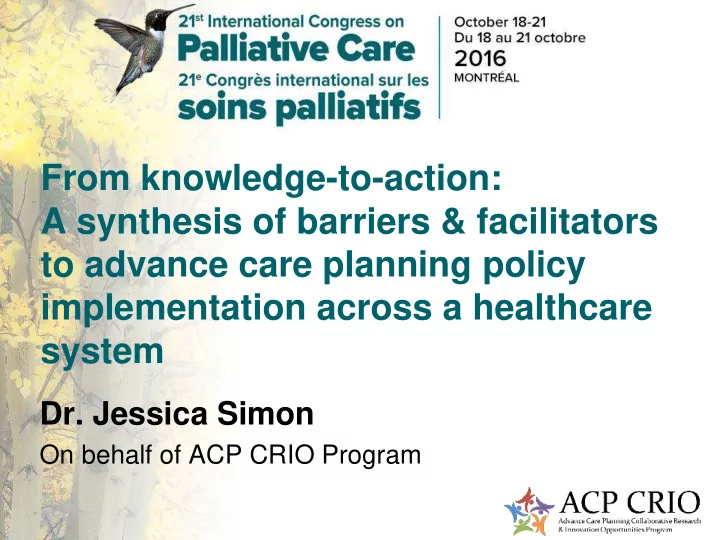

From knowledge-to-action: A synthesis of barriers & facilitators to advance care planning policy implementation across a healthcare system Dr. Jessica Simon On behalf of ACP CRIO Program
Co-authors • Marta Shaw • Lauren Hutchinson • Patricia Biondo • Reanne Booker • Jayna Holroyd-Leduc • Nancy Marlett • Sara Davison • Shelley Raffin • Eric Wasylenko • Konrad Fassbender • Sunita Ghosh • Neil Hagen • Jonathan Howlett 2
Potential Conflict of Interest Disclosure Faculty: Jessica Simon Relationships with commercial interests: Other: Physician Consultant, Advance Care Planning and Goals of Care, Alberta Health Services, Calgary Zone
Mitigating Potential Bias The following measures have been taken to mitigate potential sources of bias in this presentation. I have no financial interest in any ACP approach or program or the theoretical models or results presented.
Funding Acknowledgments Advance Care Planning and Goals of Care Alberta: a Population Based Knowledge Translation Intervention Study
Objectives • Share the theories behind our methods • Provide a synthesis of findings to date • Illustrate how we’re using this knowledge 6
What are we studying? Serves 4 Million Advance Care Planning (ACP) Goals of Care Designations (GCD) CONVERSATIONS MATTER Documentation
Our Purpose ACP CRIO objectives: 1) Support the adoption 2) Study the impact of policy in Alberta
ACP CRIO Research Questions 1. What are the barriers & facilitators to ACP uptake and readiness in Alberta for different stakeholders? 2. Are ACP tools effective to engage users, increase knowledge and change behavior? What tailored improvements or methods of implementing tools will change their effectiveness? 3. What are the most informative measures to monitor practice change and communicate results to end-users? 4. What is the impact of ACP/GCD on the trajectory of care and costs for dying patients?
Research Framework: Knowledge-to-Action Cycle Adapted from Graham et al. 2006 www.KTClearinghouse.ca
Qualitative Methods
Quantitative Surveys 2 studies 593 participants Strategic Clinical Networks Healthcare Providers
Theoretical Domains Framework ( Michie et al. ) Domains Construct (abbreviated) Knowledge Knowledge, Scientific Rationale, Procedural Knowledge Skills, Competence, Skill Assessment Skills Identity, Professional Identity, Roles, Boundaries Social/Prof. Role/Identity Beliefs about Capabilities Self-Efficacy, Empowerment, Self-Esteem, Control Beliefs about Consequences Outcome expectations, Regret, Attitudes, Reward/Sanctions Motivation and Goals Intention, Goals, Priorities, Commitment Memory & Decision Process Memory, Attention Control, Decision Making Resources (Material or Other) Environmental Context Social Influences Social Support, Group Norms, Conformity, Leadership Emotion Affect, Stress, Regret, Fear, Threat Behavioral Regulation Goals, Implementation Intention, Self Monitoring Routine, Automatic Habit or Breaking a Habit, Nature of the Behavior Hope for Improvement/Change Optimism Behavioral Reinforcement (intended and unintended) Reinforcement Michie S et al.. Qual Saf Health Care 2005;14:26–33
Michie’s Behaviour Change Wheel Michie et al. Implementation Science 2011
So what did we find?
Opportunity: The greatest barrier Physical Time & competing priorities HCP #1 barrier Time and competing priorities (54%) SCN #2 barrier “Too many conflicting initiatives” (82%) #4 “Lack of time for ACP GCD conversations” (72%) “Time hinders those conversations, because we’re focusing on different aspects of nursing care.” (Renal nurse) “I think it takes some more time and I think that’s what ties most people down is time is short” (Cancer doctor) “Doctors [have] no time to discuss with people. How does this happen within a 1/2 hour allotment during a doctor visit?” (Community group participant)
Opportunity Physical Social Time & competing priorities Patient/family preparedness SCN #1 barrier “Lack of public engagement campaign” (84%) HCP #2 barrier “Lack of patient/family preparedness” (51%) “Well, this subject is sorely lacking out there in the – in my opinion, in the big field. A public service campaign to get people talking. Public campaign may have impact.” (CWL participant) “Need to advertise, let people know to normalize the activity” (Community group member)
Opportunity Physical Social Time & competing priorities Patient/family preparedness Role Confusion Social Influences HCP #3-6 barriers: Unclear role responsibility. Others are not routinely doing ACP GCD activities. Not feeling supported by leaders to engage in ACP GCD. “ They (nurses) don’t know whether - how far they should go, what they should do.” (Supportive Living nurse) “When anyone in the family is faced with a difficult situation, everyone intuitively knows what their role is and what to do, and then right decisions are just made without us planning ahead” (South Asian participant)
Capability – Less of a barrier Physical and Psychological Conversation & Process Skills SCN Lack of clinician mastery of GCD & process (61%) HCP Own conversations skills as barrier (25%) ‘It should be almost an automatic thing… They sit people down and they start a process and they help people get through it.’ (renal family member)
Motivation- mostly a facilitator Reflective Belief in benefit HCP 95% believe ACP benefits patients SCN 92% believe ACP will help achieve patient-centerd care “A lot of people are never really prepared for stuff like that and I guess most people don’t like to think about it but you know that’s part of life, and we feel really good about it” (Family member, Supportive living)
Motivation Reflective Automatic Belief in benefit Comfort with ACP SCN Emotional discomfort initiating conversations (50%) HCP Emotional impact as deterrent (15%) “Is that a conversation that would…maybe stir up fears that are being kept at bay successfully? It just feels like you’re stripping them of something that they’re using that’s helpful to them to keep going.” (HCP, cancer) “ It’s like second nature to me” (HCP, supportive living) “Dying - nobody wants to talk about this” (Community group participant)
How are we using this knowledge? Adapted from Graham et al. 2006
Tailored interventions Team process improvement projects Patient-Family preparation tools Advocacy for Public engagement campaign
Summary Theoretical frameworks helped: Knowledge-to-Action Cycle Behaviour change Wheel Synthesis: Address barriers in Opportunity > Capability Leverage Motivation as a facilitator www.acpcrio.org Jessica.simon@ahs.ca
Please Complete the Evaluation Form
Recommend
More recommend